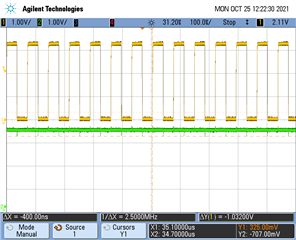Dear all
I am looking for some missing information in the datasheet of TMP117.
In the block diagram there is an internal oscillator. Do we know what is the output frequency of this oscillator ?
Thanks
Lalit
Lalit
This thread has been locked.
If you have a related question, please click the "Ask a related question" button in the top right corner. The newly created question will be automatically linked to this question.
Dear all
I am looking for some missing information in the datasheet of TMP117.
In the block diagram there is an internal oscillator. Do we know what is the output frequency of this oscillator ?
Thanks
Lalit
Lalit
Hi Lalit,
The oscillator is used internally and not available externally in any capacity. That's why it is not specified. Why are you interested in this oscillator's frequency?
thanks,
ren
Hi Ren
we have three TMP117 on the same I2C bus line. As soon as it is given 3.3 V power supply, the SCL is pulled up to 3.3 as expected and SDA has a nice clean 13 KHz pulse like a clock output. It is very strange . The ADD0 pin are connected to VDD, GND and SDA for the three TMP117 and i think somehow the ADD0-SDA pin is shorted during assembly so i need to find where and why is 13 kHz signal on SDA
DO you know the frequency of the oscilllator ? or the rate at which the conversion is happening ?
best
Lalit

Hi Lalit,
ADD0 tied to SDA is a valid configuration of the address pin. It would be necessary to tie ADD0 to either SCL or SDA to have 3 TMP117 devices on the same bus. ADD0 is an input-only and could not contribute to activity on SDA.
This oscillator runs at over 100kHz. It must cycle the logic through many states during an ADC conversion. The ADC conversions take 15.5ms when averaging is disabled. This puts the max conversion rate at 64Hz; far outside the range you're investigating.
TMP117 is an I2C slave/target. It is not capable of initiating transactions on the I2C bus. It cannot control the state of the SCL pin, and it should not take action on the SDA pin unless called upon to do so during an I2C transaction. If you find that your TMP117 takes action on the SDA line when it should not, we would consider this a faulty device and request to investigate it as a return.
Could you zoom in the timescale to see if there is an I2C transaction happening at 400kHz or (possibly) above? This is a common frequency for I2C, and the entire transaction could occur in 45us, or half your current time scale.
thanks,
ren